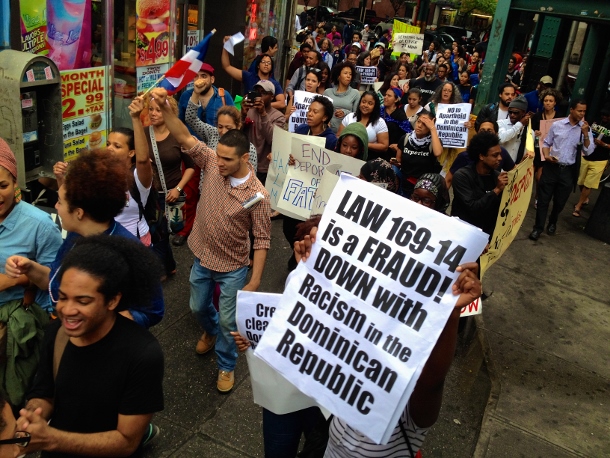Globe
Haitians, Dominicans Stand Together Against Mass Deportation Plans
Haitians, Dominicans Stand Together Against Mass Deportation Plans
To show their solidarity against a controversial plan in the Dominican Republic to deport more than 200,000 Haitians living in the country, Haitian communities across the US held peaceful demonstrations to draw attention to the issue.
Haitian-Americans held organized protests in Philadelphia, Miami, Atlanta, Boston and New York, where protestors were joined by many Dominican-Americans, who also oppose the deportation measures.
In New York, protests were held in Manhattan’s Times Square and in the Bronx, where local politicians, activists, youth groups and local clergy decried what they called a “racist” policy against Dominicans of Haitian descent.
Those demonstrators, were met by counter-protestors, including members of the Dominican Advocacy Coalition, who sought to defend the Dominican Republic’s reputation, saying the deportations have nothing to do with race and are more about securing borders, enforcing the law and preventing the already-impoverished Dominican Republic from shouldering the burden of immigrants from Haiti.
Similar groups of supporters of the Dominican law attended the anti-deportation protests in Boston. All of the demonstrations were peaceful, according to reports.
Controversial Law
Similar to the US birth laws, the Dominican Republic guaranteed citizenship for most people born in the country. But a 2013 ruling by the country’s Constitutional Tribunal removed the provision guaranteeing citizenship, deciding that people born to undocumented immigrants after 1929 are not entitled to Dominican citizenship.
However, after pressure from the international community, the Dominican government in 2013 installed an order allowing Dominicans without legal residency to apply for legal status through an amnesty program. But the program, known as “regularization,” has been marred by disorganization, and some say the requirements have proven onerous for a population that is largely poor and uneducated.
For example, under the program, migrants were required to register with the government by June 17 or face deportation. However, only 290,000 of the estimated 450,000 people eligible filed the appropriate paperwork, and those who haven’t filed the paperwork now face deportation.
Hispaniola History
Haiti and the Dominican Republic are neighbors on the island of Hispaniola. The two neighbors have had a contentious history, highlighted by Dominican dictator Rafael Trujillo’s ordering of the massacre of tens of thousands of people based upon their skin color and their ability to pronounce the Spanish word for parsley – “perejil.”
The international community, including the Dominican Republic, rallied around Haiti and its citizens in the aftermath of the 2010 earthquake that rocked the country. Following the earthquake, the Dominican Republic was one of the first countries to offer aid, including food and medicine. But that goodwill soon faded as unemployment rose in the country in addition to a cholera outbreak that was essentially blamed on the Haitian refugees.
Backlash Brings Reprieve
Due to the international backlash, the Dominican Republic essentially halted its deportation plans. However, human rights officials have encouraged its supporters to remain vocal about its opposition to the deportation play to reduce the likelihood that it will come to fruition.


